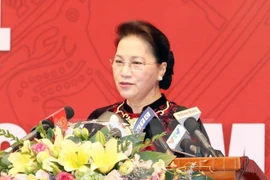The resolution (08/NQ-CP) was issued in January. It enables the implementation of an earlier resolution last year calling for management reform in Government offices to improve quality and operational efficiency.
Ministries, sectors and localities will also be asked to reduce the number of public personnel.
By 2021, the country aims to cut public-service institutions by 10 percent. This would reduce the number of institutions by 5,792. Staff would also be cut by 10 percent (about 205,000 people) over the figure of 2015.
By 2025, it hopes to further trim public service institutions by a further 10 percent (about 5,200) and staff by another 10 percent (about 185,000 people).
Also this year, the country expects to have 10 percent of public-service institutions running as financially independent units.
These moves are expected to reduce Government spending by 10 percent compared to the 2011-2015 period.
Ministries, sectors and localities have been asked to offer labour contracts to newly recruited public officials, apart from those in remote mountainous areas.
Assessment will also be carried out each year to categorise public officials, and dismiss those who fail to complete their assigned tasks for two consecutive years.
The resolution calls for an end to hiring more public employees than the assigned quota approved by authorised agencies.
Accountants, healthcare workers of schools, drivers, security guards, service workers must be re-organised and surplus staff must be laid off no later than the end of 2020.
Deputy heads are high on the list for dismissal in the first three years of the changes because, the report says, many are not working effectifvely. If deputy heads retire or move to another position, the institutions are not allowed to recruit new ones.
Under the new resolution, hospitals currently under management of ministries and sectors will be under the control of localities by the first quarter of 2019, except for those under ministries of national defence and public security.
Public scientific and technological institutions which specialise in applied research and have products that can be commercialised will be managed by economic corporations. Those specialising in basic research will be under the control of universities and academies.
People’s committees of provinces and central-level cities have been ordered to re-organise kindergartens and schools at all level to improve education quality as well as to establish multi-level schools by the fourth quarter of 2019.
Intermediate-level vocational schools will be merged with college-level vocational schools. Ineffective intermediate-level schools and colleges must be dissolved, the reporrt says.
Provinces will be asked to merge provincial public vocational schools into one by the fourth quarter of 2019.
In healthcare, the report says they must only be only one multi-tasking healthcare centre in each district. If the commune has healthcare facility, it is not allowed to set up a commune-level clinic. - VNA





























